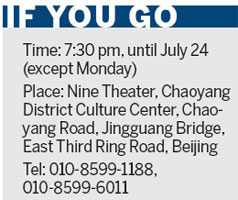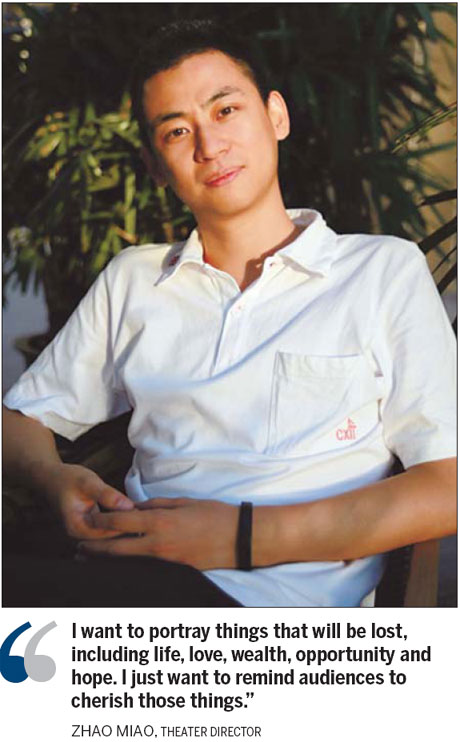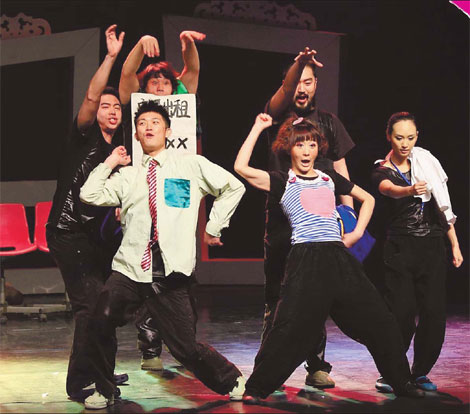Art
Beyond words
Updated: 2011-06-07 08:12
By Xu Lin (China Daily)
|
Zhao Miao's production, The Love Rhapsody of Talents, is being staged in Beijing. Provided to China Daily |
Zhao Miao's physical theater works, which focus on body movements and scarcely contain dialogue, speak to audiences despite their lack of verbalization. Xu Lin reports.
This is the biggest career year to date for theater director Zhao Miao.
Seven of his works are being staged in Beijing until July 24 to celebrate the 15th anniversary of the opening of the Santuoqi Theater he founded.
"The shows are an appropriate summary of my 15 years with Santuoqi," the 31-year-old director says, while rehearsing for a drama in a 10-square-meter room.
Zhao is one of the few young directors on the Chinese mainland who is devoted to physical theater, a genre that concentrates on the performers' bodies rather than their dialogues.
Most of his works consist of several short stories about the daily lives of ordinary people. They delve into the existences of workaholics, who ignore their families, and parents, who feel lonely when their children leave home. Every story is close to life and generates empathy among audiences.
"Words are not sufficient to express what we want to say," he says.
"In certain situations, such as when parting ways, actions are far more expressive. To see a drama is to watch the physical performance, rather than to only listen to endless talking. It's not a radio play, anyway," he continues.
"There are scenes in real life where no words are spoken. But Chinese TV programs and dramas rarely portray those silent moments. But long silence and telling body language is common in French movies and US cartoons."
China's pre-eminent avant-garde theater director Meng Jinghui says, "Zhao is a talented director with his own ideas. I like his works, which combine joy and sorrow, and fully display performers' bodies and souls."
Zhao's first contact with theater occurred when he was a junior middle school student in 1993. He followed his cousin, who was studying in the country's leading drama school, the Central Academy of Drama (CAD), to watch various plays at the university.
"At first, I had no idea what the play was about, but I was moved when a beam of light shone on the actor. It was so cool," he says.
After watching dramas for four years, Zhao wanted to rehearse them on his own. So he founded Santuoqi Theater in 1996, when he was in senior middle school. Several classmates joined him.
In the beginning, they only imitated the good dramas they had seen. Because they had no original scripts, they would watch dramas together, memorize the lines one-by-one and cobble scripts together.
They rehearsed one drama every semester and performed in class meetings, parents' meetings and the school's art festival, winning praise from students and teachers.
Zhao's dream then was to study performing arts at CAD, a goal he accomplished in 2001 after taking the national university entrance examination three times. But he had to become a theater director major because his scores weren't high enough to study other majors.
"Being a theater director allows me to express more onstage. Performers can only express the emotions of their own roles, while the director can display his emotions in the whole drama," he says.
"I spent three years trying to get into university only to discover not everyone is passionate about theater. Actually, anyone who sticks with the theater industry can make it."
He didn't know whether he should continue his theater dream or switch careers when he was about to graduate in 2005. After struggling for a year, he took the postgraduate entrance exam and furthered his study at CAD.
"I could continue my study as a theater director. And I didn't have to work during the three years, so I had more time to think about my future," he says.
Zhao's interest in physical theater took off in 2002, when he saw the British drama Three Black Tales. It was about the growth, choices and death in everyone's lives and won the Total Theater Award at the 2000 Edinburgh Festival Fringe.
He started to rehearse his own physical theater in 2003. But SARS broke out in the country that year and classes were suspended.
So, he had about five months to direct 6:3, which consists of three stories about human desire without dialogue. The play received mixed reviews. 
In 2008, his work The Love Rhapsody of Talents was a hit in Beijing, Shanghai and Guangdong province's Shenzhen city. It was the first time Zhao and his teammates didn't have to pay out of their own pockets to make a drama.
The show - one of the seven dramas that are being performed - tells different love stories. There is a white-collar man who has an affair with his colleague; a father who teaches his son to chase girls and a company director who goes on a blind date with a man she meets online.
"Physical theater is very magical. Performers can be a chair, a car or even an air conditioner on the stage. I want to portray things that will be lost, including life, love, wealth, opportunity and hope. I just want to remind audiences to cherish those things," he says.
"I never express anger, as onstage anger is never as powerful as in real life. And I never express criticism of reality, as there is no need to do so in the theater, and people are already doing that in real life."
The biggest challenge, Zhao says, is that the theater market is in chaos. There are no operation or production rules, and only those who have resources have access to success.

Specials

Birthday a new 'starting point'
China's national English language newspaper aims for a top-notch international all-media group.

Room at the inn
The Chinese hotel industry experiences a building boom, prompting fears of oversupply.

Pearls of wisdom
Chinese pearl farmers dominate the world market but now want to work smarter, not harder
